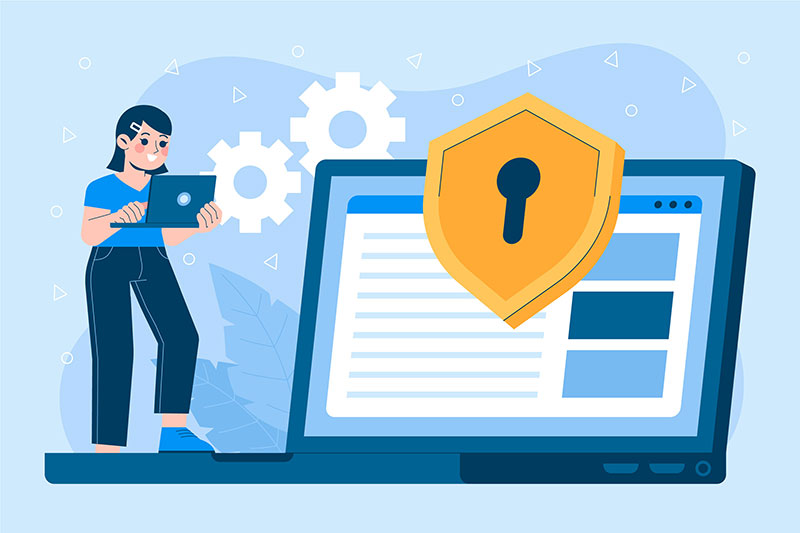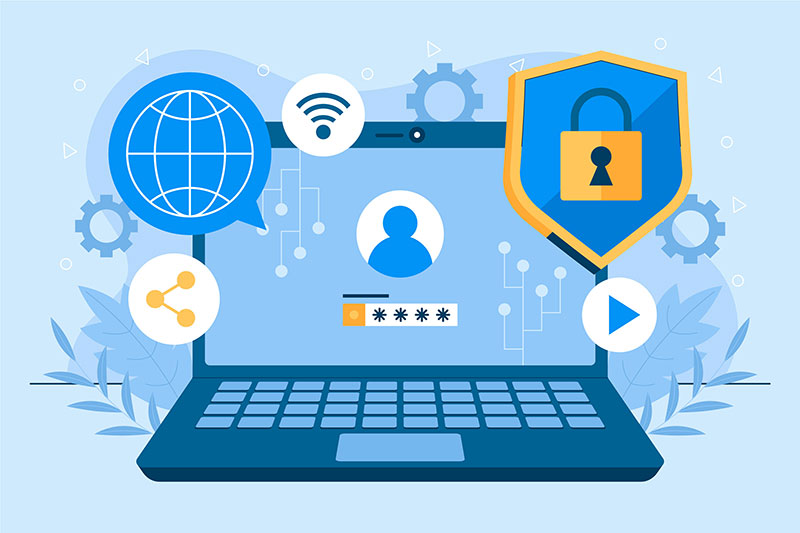5 Tips to Increase Online Courses Security
With the rise of the eLearning market, online courses security is a subject that has generated a lot of discussion, both due to the care taken with intellectual property and the data of instructors and students.
If you take courses or work as a teacher, it’s worth checking out the online safety tips we’ve prepared.

5 Ways to Increase Online Courses Security in eLearning
With the continuous advancement of technology, it is essential to maintain online security protocols that are always updated. Otherwise, the risk of websites and platforms becoming targets for cybercriminals increases significantly.
When it comes to online courses security, hosting platforms need to take extra care, since, in addition to storing intellectual property, they deal with a large amount of sensitive information, including personal and financial data of teachers and students.
For an eLearning platform, a possible leak also causes losses to the company, which loses credibility and, consequently, new sales opportunities.
On Coursify.me we take all reasonable measures to ensure the security of information and content hosted on our platform. And if you’re interested in learning about other online protection measures you can apply, check out the five practical tips we’ve listed below.
– What is an eLearning platform
1. Use a VPN
VPN means Virtual Private Network. It is a technology that allows the creation of a secure and encrypted connection between devices that are connected via the internet.
Currently, each device connected to the internet has an IP address that collects data about access and information stored on the mobile device. Using a VPN applies a layer of anonymity, masking the IP and protecting this information.
Therefore, if an online course creator is cyber-attacked, he has nothing to worry about, as the VPN uses an alternative IP address that prevents cybercriminals from accessing his data.
Is it possible install a VPN on your mobile devices, such as:
- Cell phone;
- Tablet;
- Computers and notebooks;
- Video games;
- TVs and more smart devices.
Having access and installing a VPN is quite simple and worth it to enhance online courses security.
For those seeking a more comprehensive cybersecurity solution to protect their online learning activities, using a high-quality virtual private network service can significantly enhance privacy and browsing speed.
With the right option, educators and students gain the benefits of fast connections, secure streaming, and uninterrupted access to learning resources from anywhere in the world—especially valuable when courses or materials are accessed internationally.
2. Have a good password policy
Today, it is pointed out that artificial intelligence is capable of discovering a password in a minute.
In such a futuristic scenario, how can you protect yourself? The solution lies in combining a strong password policy together with implementing two-factor access.
Even though it is a requirement that many people abhor, it is important that platforms that host sensitive data ask their users to use strong passwords that combine special characters, upper and lower case letters, numbers, etc.
In parallel to this, it is worth using a two-factor authenticator (also known as 2FA).
A 2FA is a security method that requires two forms of verification to access an account or system.
There are three main types of authentication factors:
- Something you know: a password or PIN.
- Something you have: a cell phone, a hardware token, or an authenticator app (Google Authenticator, for example).
- Something you are: a fingerprint, facial recognition or other biometrics.
Therefore, before accessing a system, the user needs to provide at least two of these factors, greatly increasing security.
For cell phones, there are apps that perform this function for free.
3. Make backups at short intervals
The best way to protect yourself is to maintain a workflow and course production powered via the cloud.
Still, it is worth reinforcing that, despite cloud computing, backups must be made at short and regular intervals to provide greater online courses security.
Coursify.me hosts your courses with redundancy and backup so that you have a safe and reliable environment, in addition to having your data encrypted.
In fact, another point worth mentioning is the end-to-end encryption used by platforms like WhatsApp, through which instructors generally communicate with their clients.
A point-to-point encryption (end-to-end encryption or E2EE) is a security technique that protects data during its transmission from one point to another, ensuring that only the sender and recipient can access and read the information exchanged.
As platforms and users work in a constant exchange of data, encryption must be the best possible.
– 5 Advantages of Moving Your Online Training to the Cloud
4. Complies with social engineering practices
You may have never heard the term “social engineering” in the context of cybersecurity before, but you have certainly met someone who fell victim to an online scam and ended up revealing a password or other important personal information.
Precisely, social engineering is a psychological manipulation technique used by criminals to trick people into disclosing confidential information or taking actions that compromise security.
In other words, instead of trying to exploit technical system vulnerabilities, attackers use trust or human behavior as an entry point, exploiting victims’ lack of knowledge or good faith.
To prevent this from happening, instructors must be attentive and guide their students regarding the following precautions:
- Be wary of unexpected emails or messages asking for confidential information.
- Verify the authenticity of communications with senders before sharing data.
- Never click on links or download files from untrustworthy sources.
Social engineering is based on the exploitation of human emotions, which makes it one of the most effective and dangerous ways of online courses security attack.
In these cases, instead of using phishing (a common practice in which the criminal sends fake emails or instant messages that appear legitimate) or fake websites, the cybercriminal enters into contact via social media or messaging apps.
In this way, he tries to create links and generate trust with the purpose of discovering the platform’s access passwords or anything compromising. Fortunately, you just need to be careful to avoid these deceptions.
– 7 Ways to Increase Your Social Media Authority
5. Create a policy for sensitive data
Education regarding the risks of cyberattacks should impact leaders, instructors and other professionals who have access to course platforms.
One policy for sensitive data is a set of guidelines, rules and practices established by an organization to protect and appropriately manage sensitive or confidential information.
This policy aims to educate and warn about possible threats that may be encountered. As well as teaching about good security practices in the online environment.
Even though it is a known practice, phishing is still in full swing and millions of malicious emails are sent every day. Therefore, all care is necessary.
GDPR and Online Courses Security
Another important aspect when we talk about online courses security is care with data privacy.
Often, the virtual class privacy settings must be in accordance with the General Data Protection Regulation (GDPR).
A GDPR establishes guidelines for the processing of personal data, with the aim of protecting privacy rights and ensuring the security of user information.
To be in GDPR compliance, the platform must meet a list of requirements, among which the following stand out:
- Identify what data is collected from the user.
- Request explicit consent from users to collect and use their data, clearly explaining how the information will be used.
- Limit data collection to the minimum necessary to provide services.
- Implement technical and organizational measures to protect data against unauthorized access, leaks or breaches.
- Define how long the data will be stored, respecting the principle of necessity.
By adopting these measures, the website demonstrates that it is committed to protecting the privacy of its users and strengthens their trust.
Ensure the security of your online course and sell more

To ensure greater online courses security, it is essential to adopt a combination of practices that protect student data, educational content, and the integrity of the teaching platform.
For leaders and educators, using a VPN is often one of the simplest and most effective ways to prevent cybercriminal attacks.
With the correct program, you can mask your IP and have full protection for uploading content without any problem.
Additionally, make regular backups, create strong passwords, keep an eye out for suspicious contacts, and instruct your students to do the same.
Finally, choose a reliable eLearning platform, which offers robust security features, such as data encryption, user authentication and protection against cyber attacks, such as Coursify.me.
In compliance with all data protection laws and requirements, Coursify.me is a secure, dynamic and customizable Learning Management System.
– Whats is a Learning Management System
Serving companies and professionals in more than 60 countries, it is the ideal solution for those who want to create, promote and sell courses on the internet.
To learn more, visit our website, test the platform and understand why we are the best option for your business.

